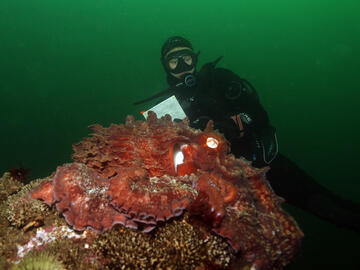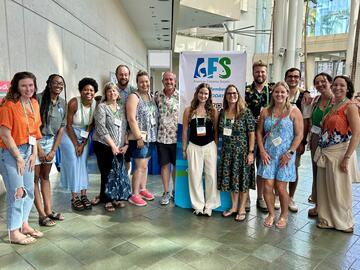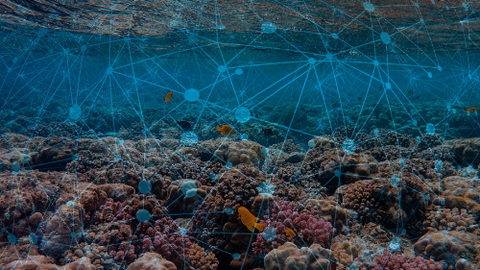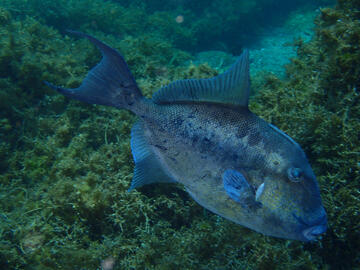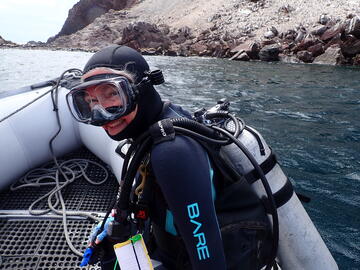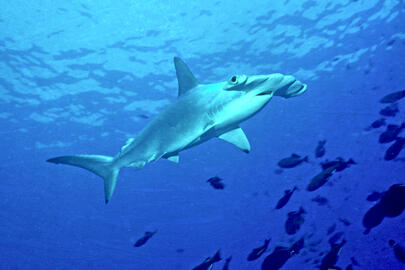The Grouper Moon Project is a conservation science partnership between REEF and the Cayman Islands Department of Environment (DoE), with scientists from Scripps Institution of Oceanography at UC San Diego and Oregon State University. The project is aimed at studying Nassau Grouper, Epinephelus striatus, a keystone species on Caribbean coral reefs. Since 2002, our team has studied the Nassau Grouper spawning aggregations in the Cayman Islands, which hosts some of the largest and last known gatherings of this endangered fish.
Did you know that the REEF Volunteer Fish Survey Project (VFSP) has generated one of the largest marine life sightings databases? This citizen science effort engages scuba divers and snorkelers to collect data on fishes and select invertebrates and algae. What began as a small effort in the Florida Keys in 1993 has since grown into a project with a global reach, inluding almost 18,000 volunteers. In 2024, the 300,000th survey was submitted to the REEF database, which now contains over 14 million sightings records. What happens to all this data?
REEF staff and collaborators attended the 154th annual American Fisheries Society (AFS) Conference last month, held in Honolulu, Hawaii. REEF's marine life database is a valuable tool for conservation science and research on a global scale, and we were proud to represent our work at this notable conference. Nine sessions at AFS featured REEF data and/or programs.
Did you know that REEF is part of an international effort to determine how to best use large fish biodiversity datasets? REEF Co-Executive Director of Science & Engagement Dr. Christy Semmens is part of a working group called "CoNCENSUS: Advancing standardisation of COastal and Nearshore demersal fish visual CENSUS techniques", led by Anthony Bernard from the South African Institute for Aquatic Biodiversity and Rick Stuart-Smith from Reef Life Survey. Christy will attend the upcoming CoNCENSUS working group meeting in South Africa this October.
Tropical regions are, in general, more diverse than ecosystems at higher temperate latitudes. A commonly held hypothesis is that the diverse predators in tropical regions cause predation to have a relatively stronger role in shaping communities. Data from the REEF Volunteer Fish Survey Project (VFSP) were used by Michele Repetto and colleagues from the Smithsonian Tropical Research Institute to test for underlying differences in regional fish diversity that could contribute to variation in predation intensity and impact.
Biogeographic and Seasonal Differences in Consumer Pressure Underlie Strong Predation in the Tropics
Tropical regions are, in general, more diverse than ecosystems at higher temperate latitudes. A commonly held hypothesis is that the diverse predators in tropical regions cause predation to have a relatively stronger role in shaping communities. Data from the REEF Volunteer Fish Survey Project (VFSP) were used by Michele Repetto and colleagues from the Smithsonian Tropical Research Institute to test for underlying differences in regional fish diversity that could contribute to variation in predation intensity and impact.
REEF and the Semmens Lab at Scripps Institution of Oceanography (SIO) are collaborating on an exciting new project that uses cutting-edge technology to improve our understanding of ocean ecosystems. The idea is simple: enable REEF volunteers to collect bits of environmental DNA (eDNA), the genetic material that animals shed into their surroundings. REEF surveyors, who are already in the water conducting fish surveys as part of the Volunteer Fish Survey Project (VFSP), are excellent candidates to help gather eDNA samples.
This paper provides a review of the 28 dwarfgobies (genus Eviota) known to occur in Fiji, including descriptions of five new species. One of these new species, Eyre's Dwarfgoby, was initially discovered and documented by REEF surveyor, Janet Eyre. This was the first of several new species that Janet's keen eyes and strong natural history sense has generated. The paper provides an illustrated key to the dwarfgoby species known to occur in Fiji, and each species is represented by a diagnosis or a description, range, habitat descriptions, and photographs.
Our partners at the Cayman Islands Department of Environment (DoE) recently used REEF data to evaluate Scalloped Hammerhead shark populations in the Cayman Islands, and their findings could mean good news for the future of hammerhead sharks in the area! The Scalloped Hammerhead is a critically endangered shark species with a decreasing global population. They are normally seen in large schools in the Pacific Ocean, but this is a rare sighting in the Atlantic Ocean, and schools of Scalloped Hammerheads have not been observed in the Cayman Islands for decades.
The Scalloped Hammerhead shark (Sphyrna lewini), a critically endangered species with a decreasing global population, is characterised by its occurrence in large schools. Such schools are still observed today in the Pacific Ocean, but this is generally not the case in the Atlantic Ocean, and in the Cayman Islands not since the 1970s. The authors of this paper report a recent record of a school of S.


